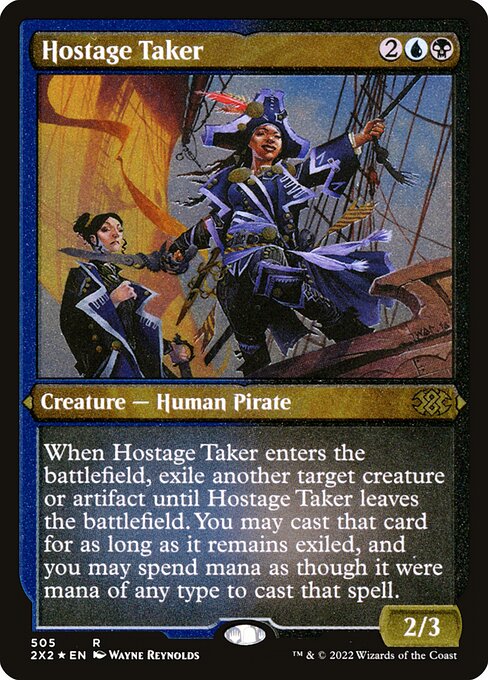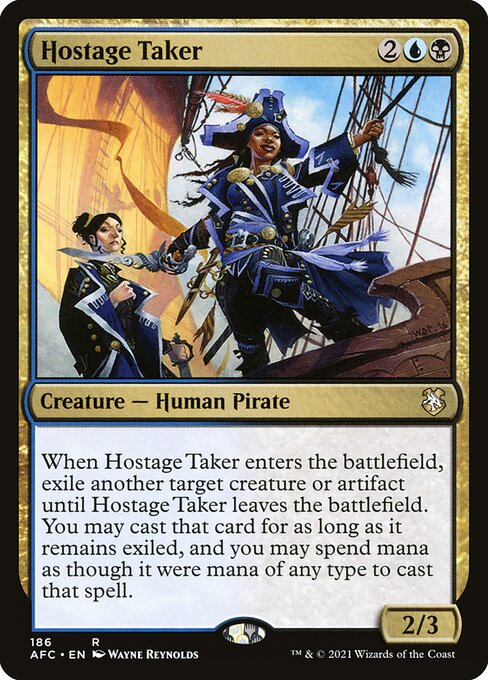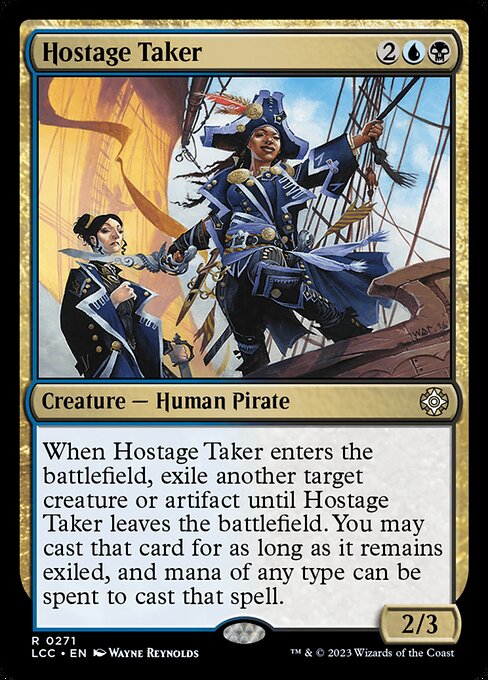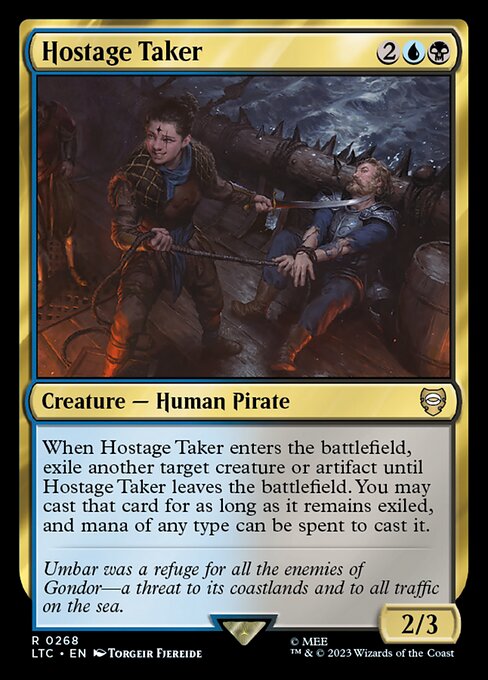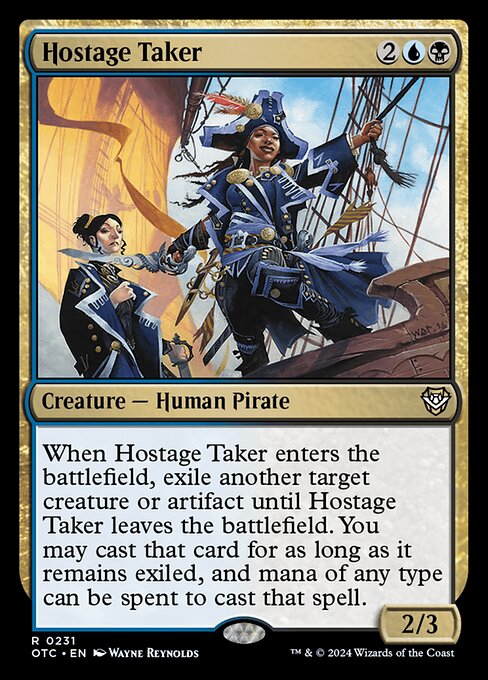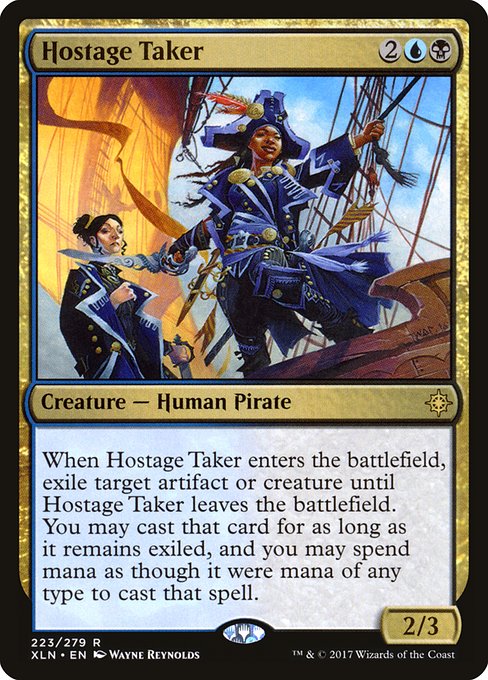Hostage Taker
Creature — Human Pirate
When Hostage Taker enters the battlefield, exile another target creature or artifact until Hostage Taker leaves the battlefield. You may cast that card for as long as it remains exiled, and you may spend mana as though it were mana of any type to cast that spell.
2/3
standard
future
historic
gladiator
pioneer
explorer
modern
legacy
pauper
vintage
penny
commander
brawl
alchemy
paupercommander
duel
oldschool
premodern
Rulings
Auras attached to the exiled permanent will be put into their owners' graveyards. Any Equipment will become unattached and remain on the battlefield. Any counters on the exiled permanent will cease to exist.
Hostage Taker has received errata to prevent it from targeting itself. The correct Oracle wording appears above.
In a multiplayer game, if a player leaves the game, all cards that player owns leave as well. If you leave the game, any spell or permanent cards you control from Hostage Taker's ability are exiled.
If it's still in exile, the exiled card returns to the battlefield immediately after Hostage Taker leaves the battlefield. Nothing happens between the two events, including state-based actions.
Once you begin to cast the exiled card, it's considered a new object. You'll control that spell and the permanent that spell becomes even if Hostage Taker leaves the battlefield.
If Hostage Taker leaves the battlefield before its triggered ability resolves, the target permanent won't be exiled.
In a multiplayer game, if Hostage Taker's owner leaves the game while the card is still exiled and another player owns that card, the exiled card will return to the battlefield under its owner's control. Because the one-shot effect that returns the card isn't an ability that goes on the stack, it won't cease to exist along with the leaving player's spells and abilities on the stack.
If a token is exiled this way, it will cease to exist and won't return to the battlefield. You can't cast it.
Hostage Taker has received errata to prevent it from targeting itself. The correct Oracle wording appears above.
In a multiplayer game, if a player leaves the game, all cards that player owns leave as well. If you leave the game, any spell or permanent cards you control from Hostage Taker's ability are exiled.
If it's still in exile, the exiled card returns to the battlefield immediately after Hostage Taker leaves the battlefield. Nothing happens between the two events, including state-based actions.
Once you begin to cast the exiled card, it's considered a new object. You'll control that spell and the permanent that spell becomes even if Hostage Taker leaves the battlefield.
If Hostage Taker leaves the battlefield before its triggered ability resolves, the target permanent won't be exiled.
In a multiplayer game, if Hostage Taker's owner leaves the game while the card is still exiled and another player owns that card, the exiled card will return to the battlefield under its owner's control. Because the one-shot effect that returns the card isn't an ability that goes on the stack, it won't cease to exist along with the leaving player's spells and abilities on the stack.
If a token is exiled this way, it will cease to exist and won't return to the battlefield. You can't cast it.
Rulings
Auras attached to the exiled permanent will be put into their owners' graveyards. Any Equipment will become unattached and remain on the battlefield. Any counters on the exiled permanent will cease to exist.
Hostage Taker has received errata to prevent it from targeting itself. The correct Oracle wording appears above.
In a multiplayer game, if a player leaves the game, all cards that player owns leave as well. If you leave the game, any spell or permanent cards you control from Hostage Taker's ability are exiled.
If it's still in exile, the exiled card returns to the battlefield immediately after Hostage Taker leaves the battlefield. Nothing happens between the two events, including state-based actions.
Once you begin to cast the exiled card, it's considered a new object. You'll control that spell and the permanent that spell becomes even if Hostage Taker leaves the battlefield.
If Hostage Taker leaves the battlefield before its triggered ability resolves, the target permanent won't be exiled.
In a multiplayer game, if Hostage Taker's owner leaves the game while the card is still exiled and another player owns that card, the exiled card will return to the battlefield under its owner's control. Because the one-shot effect that returns the card isn't an ability that goes on the stack, it won't cease to exist along with the leaving player's spells and abilities on the stack.
If a token is exiled this way, it will cease to exist and won't return to the battlefield. You can't cast it.
Hostage Taker has received errata to prevent it from targeting itself. The correct Oracle wording appears above.
In a multiplayer game, if a player leaves the game, all cards that player owns leave as well. If you leave the game, any spell or permanent cards you control from Hostage Taker's ability are exiled.
If it's still in exile, the exiled card returns to the battlefield immediately after Hostage Taker leaves the battlefield. Nothing happens between the two events, including state-based actions.
Once you begin to cast the exiled card, it's considered a new object. You'll control that spell and the permanent that spell becomes even if Hostage Taker leaves the battlefield.
If Hostage Taker leaves the battlefield before its triggered ability resolves, the target permanent won't be exiled.
In a multiplayer game, if Hostage Taker's owner leaves the game while the card is still exiled and another player owns that card, the exiled card will return to the battlefield under its owner's control. Because the one-shot effect that returns the card isn't an ability that goes on the stack, it won't cease to exist along with the leaving player's spells and abilities on the stack.
If a token is exiled this way, it will cease to exist and won't return to the battlefield. You can't cast it.
Your collection? Your decks?
Want to manage your collection and/or create decks?
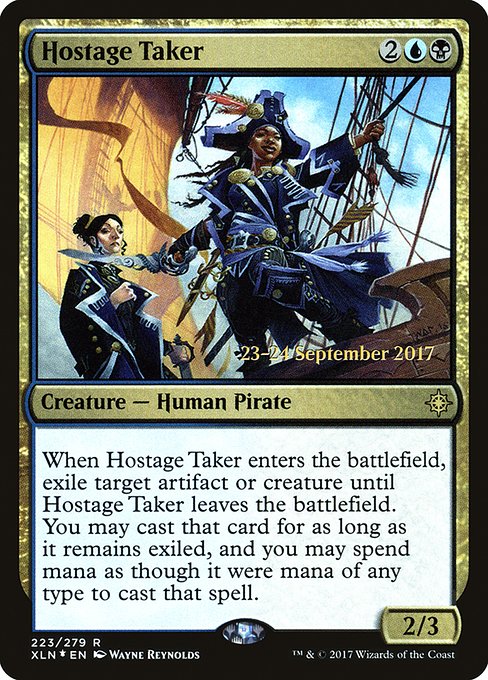

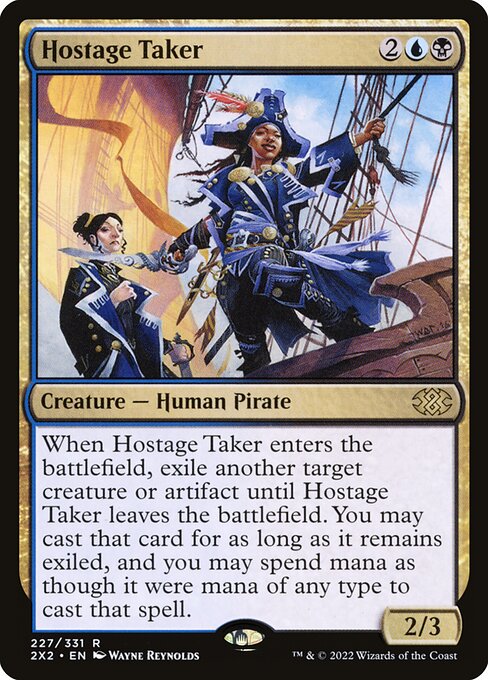
 0
0
 0.12€
0.12€
